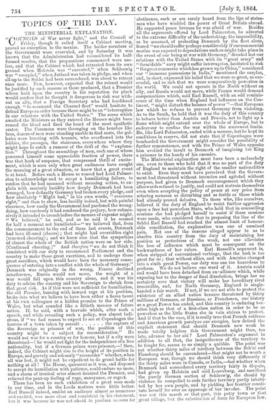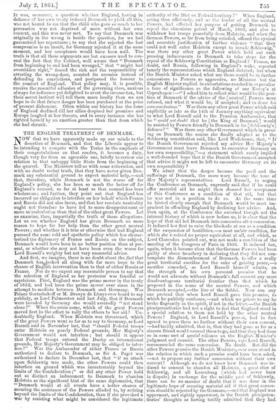TOPICS OF THE DAY
THE MINISTERIAL EXPLANATION.
"COUNCILS of War never fight," and the Council of Friday, though it called itself a Cabinet meeting, proved no exception to the maxim. The bolder members of the Government were overruled, and by Saturday it was known that the Administration had reconsidered its half- formed resolve, that the preparations commenced were use- less, and that the Cabinet which had retreated from its own ground when Holstein was "executed," when Schleswig was "occupied," when Jutland was taken in pledge, and when all up to the Schlei had been surrendered, was about to retreat once more. Few, however, expected that the retreat would be justified by such reasons as those produced, that a Premier whose hold upon the country is his reputation for pluck would confess that he thought it dangerous to risk war with- out an ally, that a Foreign Secretary who had hardihood enough "to command the Channel fleet" would hesitate to defend European order because there might be an "interruption in our relations with the United States." The scene which awaited the Ministers as they entered the Houses might have roused the blood and fired the heart of the most apathetic orator. The Commons were thronging on the benches like bees, dozens of men were standing unable to find seats, the gal- leries were bursting with tenants, who overflowed into the lobbies, the passages, the staircases, everywhere where they might hope to catch a rumour of the drift of the "explana- tion." Throughout the assemblage of men, each one of whom possessed himself some appreciable fraction of power, there was that hush of suspense, that compressed thrill of excite- ment, which is seen only when great audiences have caught the meaning of a great situation, or know that a great event is at hand. Before such a House so roused had Lord Palmer- ston to acknowledge and to accept a humiliating failure, to confess that he had menaced without meaning action, to ex- plain with masterly lucidity how deeply Denmark had been wronged, how defiantly Germany had broken every pledge, and how absolutely "Might had," in his own words, "overcome right," and then to show, less lucidly indeed, but with painful clearness, how easily the Government had pardoned the wrong- doing, how carelessly it had condoned the perjury, how submis- sively it intended to crouch before the menace of superior might. " We believed," lie said, and as he said it he seemed for half a moment not humiliated—" we believed that, from the commencement to the end of these last events, Denmark had been ill-used (cheers) ; that might had overridden right (renewed cheering); and we knew also that the sympathies , of almost the whole of the British nation were on her side. (Continued cheering.)" And therefore "we do not think it consistent with our duty to recommend Parliament and the country to make those great exertions, and to undergo those great sacrifices, which would have been the necessary conse- quence of entering into a conflict with the whole of Germany." Denmark was originally in the wrong, France declined interference, Russia would not move, the weight of a war would fall upon this country alone, and it was his duty to advise the country and his Sovereign to shrink from that great risk. As if this were not sufficient for humiliation, the old Premier, burning with inward rage at his position, broke into what we believe to have been either a fierce taunt at his own colleagues or a hidden promise to the Prince of Wales, but what sounded like a fiftieth menace of future action. If, he said, with a bravado which, after such a speech, and while revealing such a policy, was almost ludi- crous, if "we had reason to expect to see at Copenhagen the horrors of a town taken by assault the capture of the Sovereign as prisoner of war, the position of this country might be a subject for reconsideration." He would not war for a country or for honour, but if a city were threatened—! he would not fight for the independence of a free nationality, but if a German prince were prisoner,—! then, indeed, the Cabinet might rise to the height of its position in Europe, and gravely and solemnly "reconsider" whether, when all was lost, it might not be expedient to do grand battle for nothing at all ! The House, quiescent as it was, and disposed to accept its humiliation with patience, could endure no more, and a storm of ironical cries almost daunted the Premier, and relieved the pent-up feeling of rage, annoyance, or regret.
There has been no such exhibition of a great man made in our time, and in the Lords matters were little better. Earl Russell indeed, amidst an audience almost as numerous and excited was more clear and consistent in his statement, abstinence, such as are rarely heard from the lips of states- . men who have wielded the power of Great Britain abroad.
He supported peace because he was afraid of war. Besides all the arguments offered by Lord Palmerston, he adverted to the extreme difficulty of the undertaking, the impossibility, as he assumed, of protecting Denmark by the fleet alone, feared "we should suffer perhaps considerably if ourcommercial marine was exposed to depredations such as might take place in the event of our being at war with Germany," dreaded lest our relations with the United States with its "great army" and " formidable " navy might suffer interruption, hesitated to risk " thegreat commerce whichhas grown up in China," considered our "immense possessions in India," mentioned the surplus, and, in short, expressed his belief that we were so great, so sue-. cessful, and so rich that we were comparatively powerless in the world. We could not operate in the North without an ally, and Russia would not move, while France would demand compensations which, said Earl Russell, with an odd reminis- cence of the time when England had influence on the Con- tinent, "might disturb the balance of power "—that European law which he refuses to prevent Germany from violating. As to the South, he held that it was the duty of this country to behave better than Austria and Prussia, not to light up a flame which might extend over the whole of Europe, but to endeavour to confine the war within the narrowest limits. He, like Lord Palmerston, ended with a menace, but lie kept its conditions in reserve, did not state that if Copenhagen were bombarded the Government might consider the possibility of further remonstrance, and with the Prince of Wales opposite him avoided the insult to Denmark of imagining her King a prisoner in the hands of his enemies. It was, moreover, a question whether England, having in ! defiance of her own treaty induced Denmark to yield all this, I was not bound to see that the child who gave so much to her persuasion was not deprived of more without her own consent, and this was never met. To say that Denmark was originally in the wrong is beside the question, for we had guaranteed her repentance ; to say that she rejected the last compromise is an insult, for Germany rejected it at the same moment, and her acceptance would have been null. The truth is that all these arguments are but excuses used to con- ceal the fact that the Cabinet, well aware that "Denmark from beginning to end had been wronged," that "might had overridden right," feared the risk and the responsibility of arresting the wrong-doer, counted its enemies instead of defending its convictions, and postponed the honour to the comfort of England. That policy may, it is possible, receive the resentful adhesion of the governing class, anxious always for influence yet delighted to avert the income-tax, but their secret instinct will tell them more loudly than we can hope to do that future danger has been purchased at the price of present dishonour. Often within our history has the fame of England declined till her allies despised her promises and Europe laughed at her threats, and in every instance she has righted herself by an exertion greater than that from which she had shrunk.































 Previous page
Previous page